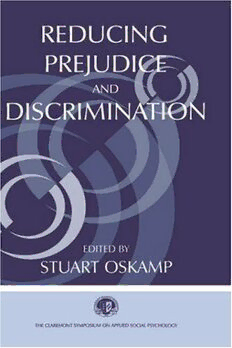
Reducing prejudice and discrimination PDF
02000·1.229 MB·English
Most books are stored in the elastic cloud where traffic is expensive. For this reason, we have a limit on daily download.
Preview Reducing prejudice and discrimination
Description:
Finding ways to reduce prejudice and discrimination is the central issue in attacking racism in our society. Yet this book is almost unique among scientific volumes in its focus on that goal. This important book combines critical analysis of theories about how to reduce prejudice and discrimination with cutting-edge empirical research conducted in real-world settings, as well as in controlled laboratory situations. This book's outstanding contributors focus on a common set of questions about ways to reduce intergroup conflict, prejudice, and stereotyping. They summarize their own research, as well as others, interpret the conclusions, and suggest implications concerning the practical methods that have been, or could be, used in programs aimed at reducing intergroup conflict. The chapters present solidly based critical analyses and research findings in clear, reader-friendly prose. This book evolved from the Sixteenth Annual Claremont Symposium on Applied Social Psychology. Each Symposium in the series concentrates on a single area in which social psychological knowledge is being applied to the resolution of a current social problem. Ideal for teachers, social workers, administrators, managers, and other social practitioners who are concerned about prejudice and discrimination, this book will also serve as a valuable foundation of knowledge in courses that examine this topic.
See more
The list of books you might like
Most books are stored in the elastic cloud where traffic is expensive. For this reason, we have a limit on daily download.
